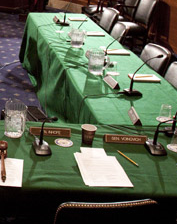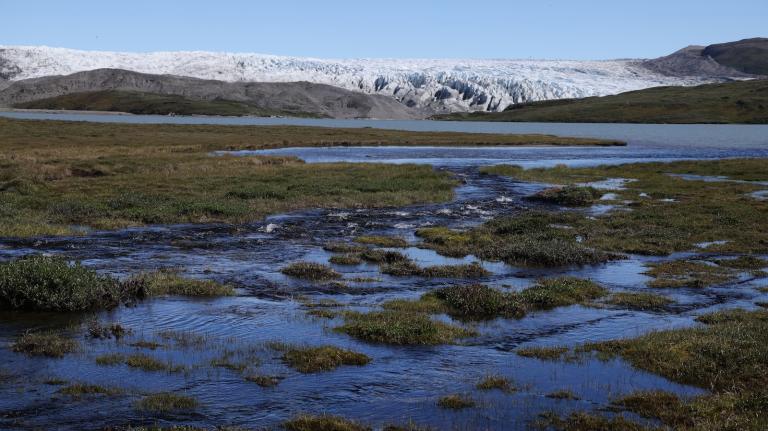 Cross-posted from the Wonk Room and co-written with energy team interns Jaren Love and Michael McGovern at the Center for American Progress.
Cross-posted from the Wonk Room and co-written with energy team interns Jaren Love and Michael McGovern at the Center for American Progress.
Senate Republicans are demanding lengthy economic analyses of progressive clean energy policy, despite having spent careers voting for and against major energy legislation without such delay. This week the Republican members of the Environment and Public Works Committee boycotted its debate on the Clean Energy Jobs and American Power Act (CEJAPA), claiming that the Environmental Protection Agency’s analysis of the economic impacts was not sufficiently thorough. Before they launched their boycott, committee ranking member Sen. Jim Inhofe (R-Okla.) and Sen. George Voinovich (R-Ohio) demanded a “full analysis” that satisfied their particular requirements:
As we’ve noted in previous letters and requests, getting a thorough, comprehensive economic analysis of the Kerry-Boxer bill is an essential component of a meaningful legislative process. To accomplish that, EPA needs to do a series of model runs examining key provisions in the bill, with a number of sensitivity analyses on critical issues, including, among others, the availability of offsets, potential growth in nuclear power, and the extent of emissions reductions by developing countries. Anything less than a full analysis of this kind will be unacceptable.
Sen. Lamar Alexander (R-Tenn.), chair of the Senate Republican Conference, piled on: “We want to participate in any clean energy bill, but we’re not willing to do that until we know what it costs.”
“It undermines the credibility of the process,” said Sen. Judd Gregg (R-N.H.). “It’s not constructive to the process to proceed without knowing what it costs.”
On Monday, Sens. Lisa Murkowski (R-Alaska), Saxby Chambliss (R-Ga.), Chuck Grassley (R-Iowa), and Kay Bailey Hutchison (R-Texas) joined Inhofe to demand a “complete and substantive analysis of any bill that attempts to address this issue” and “complete data and a thorough vetting” before the EPW Committee took action.
Yesterday, Sens. Gregg, Susan Collins (R-Maine), Olympia Snowe (R-Maine), and Lindsey Graham (R-S.C.) sent a letter to the EPA saying, “We cannot support legislation” without “a clear picture of the bill’s impacts on our economy,” saying the EPA analysis needs to be completed “prior to any action in EPW.”
Their arguments fall flat, however, because these and other senators routinely voted on energy and global warming bills without any analysis. Since 2001, the Senate has debated at least eight energy or global warming bills where there was no analysis by EPA, Congressional Budget Office, or the Energy Information Administration completed in advance of Committee deliberations. In several cases, there was no full analysis before the bill was voted on by the entire Senate:
– Energy Policy Act of 2002 (H.R. 4): EIA and CBO analysis conducted after both committee passage and full Senate consideration.
– Climate Stewardship Act of 2003 (S. 139): EIA analysis conducted before full Senate consideration. No committee consideration.
– Energy Policy Act of 2003 (H.R. 4/S. 1005): EIA and CBO analysis conducted after committee passage. Limited CBO analysis completed before full Senate consideration, EIA analysis after.
– Climate Stewardship Act of 2005 (S. 342): No analysis conducted before full Senate consideration. No committee consideration.
– Energy Policy Act of 2005 (S. 10): CBO analysis completed after committee passage, before full Senate consideration.
– Energy Savings Act of 2007 (S. 1321): CBO analysis completed after committee passage, before full Senate consideration.
– America’s Climate Security Act of 2007 (S. 2191): EIA and EPA analysis completed after committee passage, before full Senate consideration.
– American Clean Energy Leadership Act of 2009 (S. 1462): CBO analysis completed after committee passage.
Sen. Murkowski notably had no problem voting for the American Clean Energy Leadership Act this June, even though CBO analysis was only completed in September.
The fact that these and other bills moved through committees without any analysis sharply contrasts with the mountain of assessments of this year’s clean energy legislation. Full EPA, EIA, and CBO analyses were conducted of the House bill, the American Clean Energy and Security Act (ACES), and the EPA has conducted additional analysis of the Senate legislation. The Republicans’ interest in analysis is little more than an excuse for delay and defeat of clean energy legislation. In one of the boycotted hearings this week, Sen. Boxer noted that the “EPA has also indicated that this economic analysis reflects hundreds of thousands of pages of backup documentation” about the related House bill. EPA Director of Congressional Affairs David McIntosh appeared before the Committee to reiterate that CEJAPA and ACES were very similar:
[EPA economic] models are not designed to detect fine-grain details in this kind of legislation. So changes in the legislation at that level of detail will not even show up in the economic computer model. Second, it costs the EPA at least $135,000 and 1600 man-hours of time to run a bill through the agency’s full suite of economic computer models.
Nonetheless, Republican boycotters wanted EPA to spend five weeks and $135,000 of taxpayer money to conduct a redundant analysis before they would agree to a vote.
Today, the committee approved CEJAPA on an 11-1 vote. Every Republican was absent without leave.



